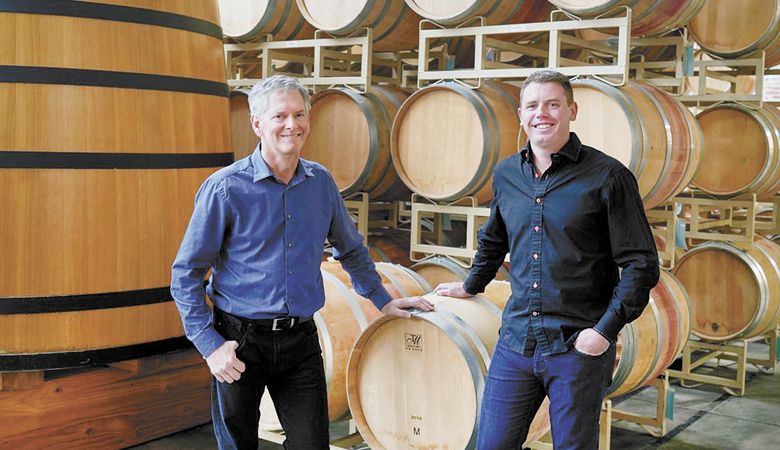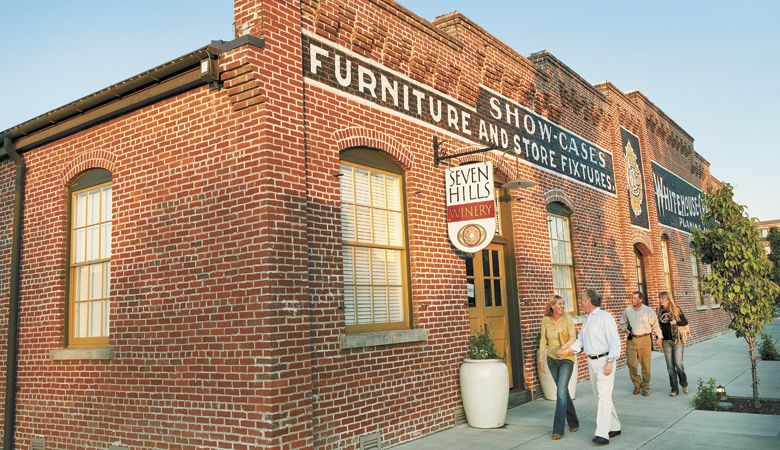Passing the Thief
Leadership changes at Walla Walla original
For the first time, Seven Hills Winery, one of the original five wineries in the Walla Walla Valley, has changed head winemakers. The baton passed earlier this year from Casey McClellan, founder of this pioneering winery with wife Vicky in 1988, to Bobby Richards. After four decades of nonstop growing and winemaking, McClellan joins his wife in retirement, who stepped down from her work at Seven Hills in 2016.
Working alongside McClellan for eight years, Richards collaborated a final time with his mentor making Seven Hills 2018 Cabernet Sauvignon. Like his predecessor, Richards’ style is to allow the terroir to speak. The ’18 Cab is a testament to this philosophy.
The original 21-acre founding vineyard, at the southern edge of what would become the Walla Walla Valley appellation, was the first significant planting in the region. “I remember the passion I had and the feeling of starting a brand-new thing in the Valley,” McClellan recalls when he and his dad planted the Old Block Merlot vineyard in 1982. In 2000, the winery relocated to the historic Whitehouse-Crawford building, featuring a distinctive tasting room that Richards plans to recast “in an apothecary style.”
Insight into the land
At a time when Walla Walla was best known for its famous sweet onions — as well as wheat, apples, asparagus and strawberries — McClellan and a handful of fellow local wine visionaries had other ideas. A fourth-generation farmer in Eastern Washington, McClellan saw the potential for wine grapes. With an astute, intimate knowledge of the area’s agricultural possibilities, he had a hunch that big reds could be a big success.
“We saw enormous potential here for growing and producing Bordeaux reds,” he says. In 1982, McClellan worked with his dad, James, and Herb Hendricks to expand the initial commercial plantings.
In 1984, Seven Hills and other growers helped earn the Valley’s AVA (American Viticultural Area) designation. Some 30 years later, in 2015, The Rocks District of Milton-Freewater achieved its own sub-AVA status on the Oregon side of the appellation. Like a number of local wine operations in the area, Seven Hills farms on the Oregon side and makes its wine in Washington.
Today, the Walla Walla Valley AVA has grown to 120 wineries and 3,000 acres of vines planted to Cabernet Sauvignon, Merlot, Syrah and others.
McClellan made good on his vow to bring Bordeaux reds to the Valley and attract world-class growers. He scored big at international wine competitions right from the start, catapulting Seven Hills and Walla Walla Valley onto the world stage. “But there was plenty of hard work to be done,” he remembers. “We had cold winters to deal with, building our market, getting recognition. It took a tremendous amount of work. Not easy.”
To McClellan, terroir is everything: “What we have in the Valley are the soil and climate for wines with a perfect trinity of fruit, tannin and acidity.”
Big shoes to fill
Richards was born and raised three hundred miles south in Albany. He earned a degree in forest management at Oregon State University and dabbled a while in restaurant ventures. Yet everything changed when he and his wife, Madeleine, worked their first job as harvest interns in 2009 at Benton-Lane Winery. “That was a game changer,” he recalls. “It all came together for me there. I loved working in the vineyards and being outdoors. What made it really special was experiencing all that with my wife. I became totally hooked on wine.”
Specifically, it was winemaking that captivated him. “The craftsmanship and creation of a product you not only drink but tells a story is fascinating to me,” Richards explains. “Just the whole process of putting the land into a bottle is an amazing craft to be part of.”
In 2013, Richards joined Seven Hills as a part-time harvest intern. Up the ladder he climbed, from intern to cellar hand to lead cellar hand to cellar master to assistant winemaker to associate winemaker to, finally, head winemaker. The ascent reflects the shared vision and working style of the two winemakers.
“I’ll stay true to what Seven Hills is, showcasing the unique terroir that we have here in Walla Walla,” Richards says. “I want to keep crafting wines that are food friendly and can age well, with nice balance, and without oak overshadowing the fruit.”
With youth comes new energy and Richards has plans. “We’ll change the tasting room around, create new experiences and start a whole new Northwest vibe.”
Upcoming projects at Seven Hills include different clones of Syrah and Grenache; continuing work on a Sauvignon Blanc project to create a fuller-bodied and complex wine using skin contact, fermented and aged in a concrete egg; and adding six acres of Rhône varietals. There’re also some restaurant collaborations ahead that Richards hopes to present in 2022.
“It will be exciting to watch Bobby put his stamp on things,” adds McClellan. “I have complete confidence in him. He respects the traditions and will make it his own.”













